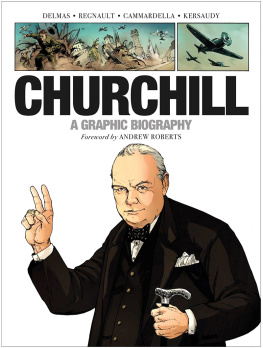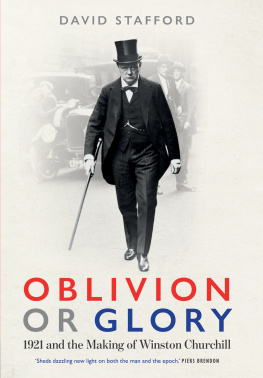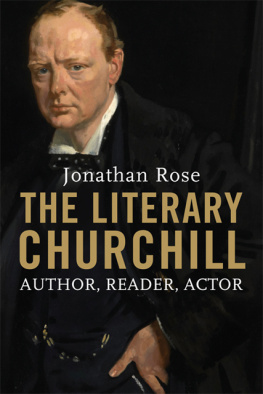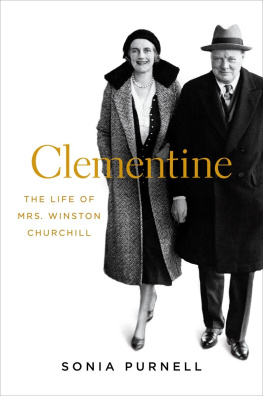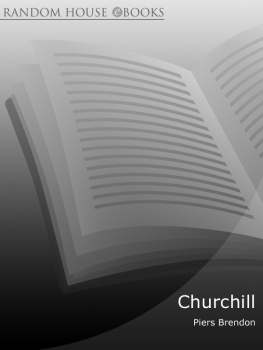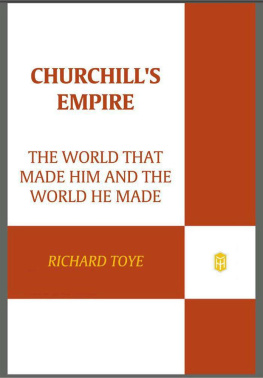Churchill
PROFILES IN POWER
General Editor: Keith Robbins
LLOYD GEORGE
Martin Pugh
HITLER
Ian Kershaw
RICHELIEU
R. J. Knecht
NAPOLEON III
James McMillan
OLIVER CROMWELL
Barry Coward
NASSER
Peter Woodward
GUSTAVUS ADOLPHUS (2nd Edn)
Michael Roberts
CHURCHILL
Keith Robbins
DE GAULLE
Andrew Shennan
FRANCO
Sheelagh Ellwood
JUREZ
Brian Hamnett
ALEXANDER I
Janet M. Hartley
MACMILLAN
John Turner
JOSEPH II
T. C. W. Blanning
ATATRK
A. L. Macfie
CAVOUR
Harry Hearder
DISRAELI
Ian Machin
CASTRO (2nd Edn)
Sebastian Balfour
PETER THE GREAT (2nd Edn)
M. S Anderson
FRANCIS JOSEPH
Stephen Beller
NAPOLEON
Geoffrey Ellis
KENNEDY
Hugh Brogan
ATTLEE
Robert Pearce
PTAIN
Nicholas Atkin
THE ELDER PITT
Marie Peters
CATHERINE DFMEDICI
R. J. Knecht
GORBACHEV
Martin McCauley
JAMES VI AND I
Roger Lockyer
ELIZABETH I (2nd Edn)
Christopher Haigh
MAO
S. G. Breslin
BURGHLEY
Michael A. R. Graves
NEHRU
Judith M. Brown
ROBESPIERRE
John Hardman
LENIN
Beryl Williams
WILLIAM PENN
Mary Geiter
THE YOUNGER PITT
Michael Duffy
KAISER WILHELM II
Christopher Clark
TANAKA
David Babb
First published 1992 by
Pearson Education Limited
Published 2014 by Routledge
2 Park Square, Milton Park, Abingdon, Oxon OX14 4RN
711 Third Avenue, New York, NY, 10017, USA
Routledge is an imprint of the Taylor & Francis Group, an informa business
Pearson Education Limited 1992
The right of Keith Robbins to be identified as author of this Work has been asserted by him in accordance with the Copyright, Designs and Patents Act 1988.
All rights reserved; no part of this publication may be reproduced, stored in a retrieval system, or transmitted in any form or by any means, electronic, mechanical, photocopying, recording, or otherwise without either the prior written permission of the Publishers or a licence permitting restricted copying in the United Kingdom issued by the Copyright Licensing Agency Ltd, 90 Tottenham Court Road, London WIT 4LP
British Library Cataloguing-in-Publication Data
A catalogue record for this book can be obtained from the British Library
Library of Congress Cataloging-in-Publication Data
A catalog record for this book can be obtained from the Library of Congress
ISBN 13: 978-0-582-43759-3 (pbk)
CONTENTS
PREFACE
As the years pass, the editorial in the February 1991 Newsletter published by the Winston Churchill Memorial Trust sadly suggested,
it is becoming increasingly evident that the average British citizen is less and less aware of Sir Winston Churchill his life, his character, his contribution to this country and his legacy to the world. Personal memories of him are beginning to fade, and the school teaching of history or current affairs does not sufficiently cover his commanding role in national and world affairs in the first half of the 20th century. This lack of knowledge often proves embarrassing to Fellows not only during their Fellowship interviews, but also when their hosts enquire about the origins and aims of the Trust.
I was myself the grateful holder of a Travelling Fellowship from the Churchill Trust in 1990 and it enabled me to carry out an extensive programme of travel and interviews in many European countries. Since I met many modern historians in the course of my journey, it is perhaps not surprising that they possessed a greater knowledge of Churchill than the gloomy editorial feared. I also came across a new first translation into Magyar of Churchills The Second World War testimony to the fact that he still has something to say to the changing Europe of our time. Yet, there can be no doubt that the underlying contention of the editorial is correct. The name and face of Churchill are known all over the world, but the average British citizen would find it difficult to come to a balanced appreciation of his greatness. He seems at once a contemporary and a remote figure.
This book will not supply the average British student with everything that is to be known about Winston Churchill. In keeping with the objectives of this series, however, it seeks to give an outline of his career but, more fundamentally, to uncover what made possible that commanding role in national and world affairs in the first half of the 20th century. His own attributes were given expression in an extraordinary empire in the final phase of its life. He lived long enough to experience the implications for his own creed which were inherent in its demise. He had an acute sense of the fluctuating fates of individuals and nations. Power could not be explained, but its achievement and its loss could be felt, both individually and nationally. Churchill did not seize power but he mingled with men who did. He had, indeed, at times a commanding role but he was not so foolish as to suppose that even a man of power could shape the pattern of history. Meditation on his own career, however, with its unpredictable changes of fortune, suggested that there was a tide in the affairs of men which could be taken at the flood. Yet the victory which he helped to achieve had about it the smell of defeat. In his Indian Summer, it was not clear whether his long political journey led to the birth of a new Britain or merely the death of an old. There was plenty of evidence and plenty of doubt.
Professor Martin Pugh kindly performed an editorial task for the general editor, but mistakes or misjudgments are mine. This volume is dedicated to my former colleagues in Glasgow for their stimulus and friendship in the dozen years I spent with them. Doing history in a university over such a period of change has not been without some toil, tears and sweat but happily it has been without blood and with more than an occasional element of laughter!
TO MY FORMER COLLEAGUES IN THE DEPARTMENT OF MODERN HISTORY UNIVERSITY OF GLASGOW 19801991
Winston Churchill was born in the heart of England on St Andrews Day, 30 November 1874. His place of birth was Blenheim Palace, the magnificent house built at Woodstock in rural Oxfordshire between the years 1705 and 1722. It was the gift of a grateful sovereign to John Churchill, first Duke of Marlborough, conqueror of the French and victor in the battle of Blenheim. Kings and princes from across Europe had to confess that even their palaces could not compare with the stately home of the Spencer Churchills, Dukes of Marlborough. The Victory column in the grounds of the palace reminded all visitors of a great English soldiers achievements and of the rewards of success. John Churchill was Winstons ancestor. A baby born at Blenheim was liable to have an unusual perspective on life.1



